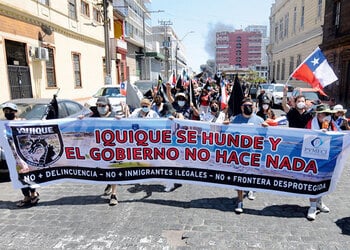Chilean politicians are in an uproar as the country’s northern Tarapacá region, which borders Bolivia, has seen homicides soar to alarming levels.
On August 5, a Venezuelan man was shot dead in the port city of Iquique, the economic heartland of the Tarapacá region. This marked the 31st homicide so far this year in Tarapacá, with the region on course to surpass the 51 murders registered there in 2021.
This would be alarming as in 2021, Tarapacá already saw homicides increase by a staggering 183 percent over 2020. The region’s homicide rate, around 14 per 100,000 residents, is currently at almost four times Chile’s national average.
Some in Chile’s congress are demanding action. In early August, parliamentarians representing constituencies in northern Chile founded a new political alliance and urged the government to declare a state of emergency.
For while police have arrested dozens of members of alleged micro-trafficking gangs, blamed for running gun battles in Iquique, homicides have continued to climb, news platform Mega Noticias reported.
SEE ALSO: Weapons Traffickers Target Chile’s Port of Iquique
Drug seizures also continue to mount as shipments of various drugs have come across the border from Bolivia and from overseas. On August 3, almost 500,000 pills of ecstasy and over 120 kilograms of MDMA were found having been brought through the port of Iquique from the Netherlands. And in June, after a seizure of cocaine, coca paste, and marijuana from Bolivia, Tarapacá’s chief of police, Sergio Telchi, said drug seizures on the region were well on their way to beating the 7.5 tons of drugs seized in 2021.
Authorities blame much of the growing violence and crime on foreign gangs. As reported recently by InSight Crime, Venezuelan gang Tren de Aragua has gained a strong presence in Tarapacá. The gang entered Chile by smuggling in Venezuelan migrants but is also involved in moving drugs, weapons, and contraband into Chile, according to InSight Crime investigations.
The issue has become a national talking point with Chile’s President Gabriel Boric promising to chase down Tren de Aragua members and expel them from the country.
InSight Crime Analysis
There are a number of reasons for increasing violent crime in Iquique and the Tarapacá region.
First, located on the coast of northern Chile, Iquique has long been a key to Bolivian traffickers smuggling cocaine across the border. Synthetic drug traffickers from Europe are using Chile’s northern ports as entry points for their product, hoping to access one of South America’s larger drug markets.
The problem is that weapons are also coming into the area. Arms trafficking networks have begun to use the port of Iquique as a destination. Firearms are increasingly entering Chile in maritime cargo, and weapons smugglers have run operations through the northern ports, as InSight Crime has previously reported.
SEE ALSO: Chile: One More Departure Point for Europe-Bound Cocaine
Second, the surge in migration has also brought new groups looking to control these well-established transnational criminal economies.
Obliging many Venezuelan migrants to carry drugs into the country and coercing others into forced sexual labor has given gangs like the Tren de Aragua ready streams of criminal income. The group has also become adept at partnering with smaller gangs across Chile, outsourcing parts of the drug and sex trafficking trade. This follows a model the gang already established in Peru.

